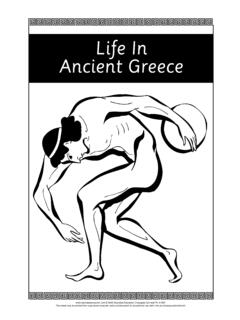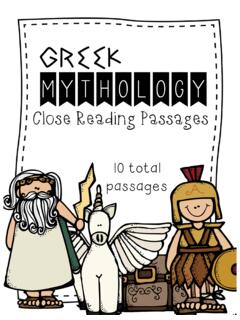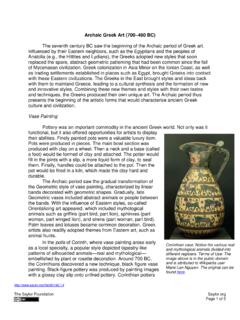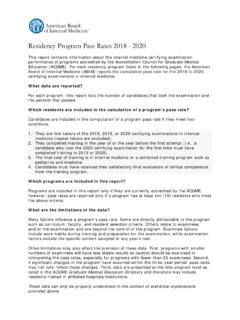Transcription of ANCIENT GREEK GOVERNMENT SYSTEMS
1 HOW DO WE BEST DEFINE ANCIENT GREECE? NAME: _____ ANCIENT GREEK GOVERNMENT SYSTEMS Read the following primary source documents using the critical reading method that was taught during the introductory unit and then answer the questions that follow each document. As you read this source, remember to: Circle words you do not understand. Underline sections that are unclear. Periodically make notations in the margin that summarizes what you have just read. Write the question number (from the previous exercise) next to where you found the answer in the text (the number can be placed in the sentence or after it). You MUST write your answers on a separate sheet of paper. The Funeral Oration of Pericles (431 BCE) Our constitution is called a democracy because the power is in the hands not of a minority but of the whole people.
2 When it is a question of settling private disputes, everyone is equal before the law; when it is a question of putting one person before another in position of public responsibility, what counts is not membership of a particular class, but the actual ability which the man possesses. No one, so long as he has it in him to be of service to the state, is kept in political obscurity because of poverty. And, just as our political life is free and open so is our day-to-day life in our relations with each other. We do not get into a state with our next door neighbor if he enjoys himself in his own way, nor do we give him the kind of blank looks which though do no real harm, still do hurt people s feelings. We are free and tolerant in our private lives; but in public affairs we keep to the law.
3 This is because it commands our deep respect. We give our obedience to those whom we put in positions of authority, and we obey the laws themselves, especially those which are for the protection of the oppressed, and those unwritten laws which it is an acknowledged shame to break. Here each individual in interested not only in his own affairs but in the affairs of the state as well; even those who are mostly occupied with the affairs of their own business are extremely well informed on general politics- this is a peculiarity of ours: we do not say that a man who takes no interest in politics is a man who minds his own business; we say that he has business here at all. We Athenians, in our own persons take our decisions on polity or submit them to proper discussions: for we do not think there is an incompatibility between words and deeds; the worst thing is to rush into action before the consequences have been properly NOTES Questions: 1.
4 Explain how this document describes the following aspects of Athenian life and democracy: a. Political Power b. Requirements for public office c. Tolerance 2. What does the following quote mean, this is a peculiarity of ours: we do not say that a man who takes no interest in politics is a man who minds his own business; we say that he has no business here at all ? Aristotle: On the Lacedaemonian Constitution (340 BCE) At Sparta everyone is eligible, and the body of the people, having a share in the highest office, want the constitution to be permanent. Some, indeed, say that the best constitution is a combination of all existing forms, and they praise the Lacedaemonian because it is made up of oligarchy, monarchy, and democracy, the king forming the monarchy, and the council of elders the oligarchy while the democratic element is represented by the Ephors; for the Ephors are selected from the people.
5 There is a tradition that, in the days of their ANCIENT kings, they were in the habit of giving the rights of citizenship to strangers, and therefore, in spite of their long wars, no lack of population was experienced by them; indeed, at one time Sparta is said to have numbered not less than 10,000 citizens Whether this statement is true or not, it would certainly have been better to have maintained their numbers by the equalization of property. Again, the law which relates to the procreation of children is adverse to the correction of this inequality. For the legislator, wanting to have as many Spartans as he could, encouraged the citizens to have large families; and there is a law at Sparta that the father of three sons shall be exempt from military service, and he who has four from all the burdens of the state.
6 Yet it is obvious that, if there were many children, the land being distributed as it is, many of them must necessarily fall into Ephors are chosen from the whole people, and so the office is apt to fall into the hands of very poor men, who, being badly off, are open to bribes. The Ephoralty certainly does keep the state together; for the people are contented when they have a share in the highest office, and the result, whether due to the legislator or to chance, has been advantageous. NOTES Questions: 1. Explain how this document described the following aspects of Spartan life and GOVERNMENT : a. Family b. Political Participation 2. Why might the Spartan GOVERNMENT encourage families to produce multiple offspring and to allow so many other individuals to gain citizenship to Sparta?
7 Critical Thinking: 1. What are the similarities and differences in Athenian and Spartan GOVERNMENT SYSTEMS ? 2. What title(s) could be used to define the time period of ANCIENT Greece based upon your study of ANCIENT GREEK governments? HOW CAN WE BEST DEFINE ANCIENT GREECE? NAME_____ HOW CAN THE SOCIAL CLASSES OF ANCIENT GREECE DEFINE THE TIME PERIOD? As you read these sources, remember to : Circle words you do not understand. Underline sections that are unclear. Periodically make notations in the margin that summarizes what you have just read. DOCUMENT 1 Population of Athens Women & children citizens (c. 120,000 Adult male citizens (c. 40,000) Metics (resident aliens) (c. 50,000) Slaves (c. 90,000) DOCUMENT 2 Spartan Population Approximately 8,000 Spartiates (adult male citizens) ruled over a population of 100,000 enslaved and semi-enslaved people.)
8 DOCUMENT 3 Aristotle, On a Good (Athenian) Wife circa 330 BCE A good wife should be the mistress of her home, having under her care all that is within it, according to the rules we have laid down. She should allow none to enter without her husband's knowledge, dreading above all things the gossip of gadding women, which tends to poison the soul. She alone should have knowledge of what happens within. She must exercise control of the money spent on such festivities as her husband has approved---keeping, moreover, within the limit set by law upon expenditure, dress, and ornament---and remembering that beauty depends not on costliness of raiment. Nor does abundance of gold so conduce to the praise of a woman as self-control in all that she does.
9 This, then, is the province over which a woman should be minded to bear an orderly rule; for it seems not fitting that a man should know all that passes within the house. But in all other matters, let it be her aim to obey her husband; giving no heed to public affairs, nor having any part in arranging the marriages of her children. DOCUMENT 4 Excerpt from Plutarch s Life of Lycurgus (King of Sparta) First he toughened the girls physically by making them run and wrestle and throw the discus and javelin. Thereby their children in embryo would make a strong start in strong bodies and would develop better while the women themselves would also bear their pregnancies with vigor and would meet the challenge of childbirth in a successful, relaxed a result the women came to talk as well as to think in a way that Leonidas wife Gorgo is said to have done.
10 For when some woman, evidently a foreigner, said to her You Spartan women are the only ones who can rule men, she replied That is because we are the only ones who give birth to men. DOCUMENT 5 Aristotle The citizen should be molded to suit the form of GOVERNMENT under which he lives. The customary branches of education are in number four; they are---(1) reading and writing, (2) gymnastic exercises, (3) music, to which is sometimes added (4) drawing. Of these, reading and writing and drawing are regarded as useful for the purposes of life in a variety of ways, and gymnastic exercises are thought to infuse courage. Concerning music a doubt may be our own day most men cultivate it for the sake of pleasure, but originally it was included in education, because nature herself, as has been often said, requires that we should be able, not only to work well, but to use leisure well; for, what ought we to do when at leisure?





